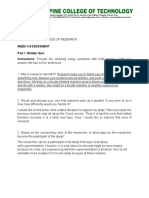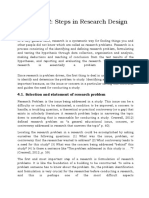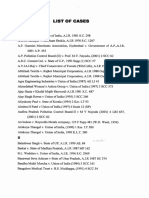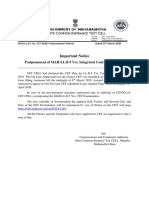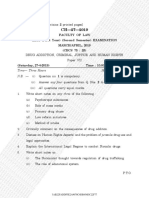The Importance and Development of Research Problem: A Didactic Discuss
The Importance and Development of Research Problem: A Didactic Discuss
Uploaded by
Mahebub GhanteCopyright:
Available Formats
The Importance and Development of Research Problem: A Didactic Discuss
The Importance and Development of Research Problem: A Didactic Discuss
Uploaded by
Mahebub GhanteOriginal Title
Copyright
Available Formats
Share this document
Did you find this document useful?
Is this content inappropriate?
Copyright:
Available Formats
The Importance and Development of Research Problem: A Didactic Discuss
The Importance and Development of Research Problem: A Didactic Discuss
Uploaded by
Mahebub GhanteCopyright:
Available Formats
International Journal of Economics, Commerce and Management
United Kingdom Vol. V, Issue 8, August 2017
http://ijecm.co.uk/ ISSN 2348 0386
THE IMPORTANCE AND DEVELOPMENT OF
RESEARCH PROBLEM: A DIDACTIC DISCUSS
Augustine E. Akhidime
Associate Professor, Department of Accounting,
Benson Idahosa University, Benin-City, Nigeria
aakhidime@biu.edu.ng, dr.augustine@akhidime.com
Abstract
This paper aims at assisting budding researchers, particularly in the social and management
sciences to have better approach to handling doable research projects. The paper provides a
lucid and practical discussion on the importance and simple strategies involved in the
identification and development of researchable problems; processes that are considered to be
the cornerstone and precursor for a feasible and successful research effort. The paper relies on
extant literature and basic teaching methodology in presenting in very simple form a narrative
of the systematic building blocks of research problem development which begins with the
explanation of the concept of research, research cycle, sources of research problem,
statement of research problem, questions, objectives and hypotheses. The paper concludes
that the importance of research problem lies in the fact that the entire research efforts begin
with the articulation and formulation of researchable problem from the research topic, from
which the research problem is developed further into research questions, objectives, and
hypotheses which are tested to produce results/findings that provide the basis for arriving at a
conclusion on the attainment of the research objectives and from which recommendations are
drawn that may throw up new problems for further research.
Keywords: Researchable problem; Research problem; Research cycle; Knowledge-gap;
Research proposal
Licensed under Creative Common Page 631
© Akhidime
INTRODUCTION
The importance and development of research problem can best be articulated from having first,
a clear understanding of what research is all about. Research is credited to produce the
required spring board for human, societal, technological advancement and development in
countries that recognize its value and prioritise its importance. Research has been defined and
explained in various forms by various scholars and authorities.
From an informal approach, the simple explanation of research can be deduced from its
compound wording-„re‟ and „search‟. The word, „re‟ implies „continuity‟ and the word „search‟
implies among other meanings: inquiry, investigation, examination, „experimentation‟ or effort
towards finding out or discovering something hitherto unknown of unfound.
Piecing the two words together, a research therefore represents a continuous search,
inquiry, investigation, examination, experimentation of required knowledge or information that
could lead to the discovery of appropriate solution to a particular problem. The search becomes
continuous as newfound solution to a particular problem over time develops another set of
problems that would necessitate further research for new set of solutions. For example, the
search for a better lighting led to the discovery of the electric bulb.
Electric bulb over time generated its own sets of problems in the form of high electricity
power consumption and generation of intense heat among others. A further search (research)
for solution to these new sets of problems from the electric bulb led to the discovery of
Fluorescent bulbs. Soon the fluorescent bulb was found to require certain minimum level of
electricity voltage without which it begins to dysfunction.
Further search for solution over the new problem from the Fluorescent bulb led to the
discovery of variants of better performing energy-saving lightings that are further being
improved upon by continuous research. Every research begins with the identification of a
problem and ends with solution that eventually creates further problem for yet another research
concern.
Research is not a one-off set of activity, but a process that consists of series of
systematic and interrelated activities that are aimed at obtaining solution to particular problem
(Nachmias, &Nachmias, 1996).
Taken from a formal angle, research can be described as a process that consists of the
identification and definition of problem, the formulation and testing of hypothesis through the
collection, organisation and evaluation of data, the making deductions and reaching of
conclusion from the test results of the hypotheses.
From the foregoing, research is essentially problem driven as most researches are
undertaken to provide solution to an identified problem. This problem for pure research could be
Licensed under Creative Common Page 632
International Journal of Economics, Commerce and Management, United Kingdom
in the form of an unknown phenomenon or knowledge; orin an applied research, about a
practical problem whose solution would enhance the quality of human life.
Figure 1. Research Cycle
Problem Knowledge-Gap (e.g, need for better product, process or information/knowledge)
Solution New Knowledge (New/improved product/process)
Problem Knowledge Gap (Limitations in the new product, processor information/knowledge)
CONCEPT AND IMPORTANCE OF RESEARCH PROBLEM
A research problem could present itself as a condition to be improved upon, a difficulty or
deficiency to be overcome, or a gap in knowledge that exists in scholarly literature that is to be
filled, or theory that requires meaningful understanding. It could also concern a body of
knowledge or views held in different clime that requires validation or confirmation for local
application.
The formulation of research problem constitutes the starting point and the most
important phase of any research process (Jessa, 2010). The importance of research problem
cannot be over emphasized as it serves as the foundation of a research effort and upon which
the success or failure of the research undertaking well depends on the appropriateness in both
the selection and formulation and development of the research problem.
Research problem provides direction and defines the purpose(s) of any particular
research, which could be one or combination of the followings:
i. The filling of existing knowledge gap or gap in knowledge
ii. Knowledge of the relationship among different aspects of nature or phenomenon
iii. Testing and verification of new or old body of knowledge, theories or beliefs.
iv. The need for theory construction
v. Resolution and clarification of contradictory findings or classical problems
vi. Informing changes in present practice?
The importance of research problem is underscored by the way its recognition has been in the
academic world (Kothari, 2012). For example synopsis is accepted as a formalized version of
research problem, as most post graduate research programmes require a synopsis that
accentuates the research problem.
Licensed under Creative Common Page 633
© Akhidime
Also researchers seeking for grant from research funding organisations are required to submit a
project proposal, which is a statement of carefully articulated research problem and the
proposed ways or methods at solving it.
Formulated, feasible and appropriate research problem provides the basis for research
questions, objectives and hypotheses development and testing, the result of which constitute
the findings on which conclusion on the attainment of the research objectives andits
contributions to knowledge.
Formulation and Development of Research Problem
Sources of research problem
Discussion on the formulation of research problem should begin from knowing about some of
the sources of finding research problem.
Based on existing practices and literature, research topics that embed research
problems can be sourced from the followings:
Collaboration with Research supervisor
Students who are desirous of pursuing research for a degree are generally expected to
suggest at least three tentative research topics from which feasible research problems are to
be developed. The student research supervisor is expected to review each of the research
topics with the student and together select a particular one, and the student is eventually
made to develop a research proposal on the chosen topic in order to ascertain the
researcheability of the topic.
Students’ independent effort
While students are allowed to produce a number of research topics for the supervisor‟s review
and approval, the question that then arises is: “where do the students source for their research
topics”? Students‟ common source of research topics for development into research problem is
the internet. There are internet addresses that with a click can roll out research topics from
virtually all fields of knowledge. The second source is perhaps the physical or virtual library
which stores copies of previous research works of graduated students.
In all the active involvement and participation of students in the choice of their research
problem would engender and sustain their interest in the research work as against forcing a
research problem on them to handle (King, 2010).
Licensed under Creative Common Page 634
International Journal of Economics, Commerce and Management, United Kingdom
Research literature
One of the outstanding purposes or desired benefits against which the value of a research effort
is weighed is its categorical contribution to knowledge. The body of knowledge a research is
expected to contribute or add value to consist of previous studies as espoused in the literature.
This is why literature review is regarded as a very important phase in the articulation of research
problem.
Literature on related previous studies on the researcher‟s area of interest holds great
promises for the articulation of research problems. The nature of research problems that evolve
from literature whose findings are considered as contribution to knowledge can be categorized
as follows:
a) Knowledge Gap/ Gap in literature: One of the features of a good research
problem is that it should evolve from existing literature. No research as previously
demonstrated is absolutely conclusive hence the need for researchers to indicate
the limitations of their study as well as suggest further areas of study. Gaps in
existing literature could manifest in any of the following areas:
i. Need for a larger sample or longer period.
ii. Need to replicate present study using different methodology or examining
different participants and different research sites?
iii. Need to replicate the study in a different clime (e,g if previously done in
developed countries to be repeated in developing countries)
iv. Need to replicate the research using different industry or setting.
v. Need to mitigate or avoid the limitations in the previous study.
b) Contradictory findings: Where literature on previous studies show contradictory
findings from studies on the same problem, the need for further researches to
confirm or explain the rationale behind the contradiction becomes imperative
(Obadan, 2012).
c) Research funding agencies
As a furtherance of the „town and gown‟ connectivity and in the pursuit of
research and development or even for the pursuit of humanitarian goals, a good
number of research problems are generated and studies on them are funded
by corporate bodies, government agencies and non-governmental/civil
societies.
d) Other sources
Research problems can also be sourced from other uncommon sources such as
some prevailing, topical, social-economic or political problem of interest, pattern
Licensed under Creative Common Page 635
© Akhidime
of behavior, some body of untested theories, personal/group brainstorming or
personal inclination or area of special interest.
Research problem, Research topic and Research Title
There is a nexus between research problem, research topic and research title. While research
topic is the area of study or subject matter of interest on which the problem rests or is derived
from, research title provides the operational expression of the research problem in a manner
suggestive of the scope, required methodology in terms of the research design, required data,
data collection and method of analysis for investigating or solving the research problem
(Onyeizugbe, 2013).
Research problem is embedded in a particular chosen area of study (topic) while the
research title clarifies what the problem is all and provides the specifications and directions for
solving the problem.
Table 1. Linking Research Problem with Research Topic and Research Title
BROAD RESEARCH AREA OF INTEREST Broad subject=ACCOUNTING
(Subject Area of Study) Specific subjects=*(Financial Accounting/
Corporate Financial Reporting, Management
accounting, Costing, Taxation, Auditing and
Investigation, Forensic Accounting, Financial
Management)
SPECIFIC ISSUE/MATTER OF CONCERN Topic from Financial Accounting/Corporate
(Research Topic) Financial Reporting:
ADOPTION OF INTERNATIONAL FINANCIAL
REPORTING STANDARDS
RESEARCH TITLE
*‘Effect of International Reporting Standards
(Defined Problem)
Adoption on Corporate Performance’
Author‟s illustration (2017)
*The research topic and title flow from the specific Accounting Subject :Financial Accounting & Corporate
Financial Reporting subject/course
Licensed under Creative Common Page 636
International Journal of Economics, Commerce and Management, United Kingdom
Table 1 above is further illustrated in Fig 2 for clearer understanding.
Figure 2. Research Problem formulation
BROAD RESEARCH AREA OF INTEREST (ACCOUNTING)
*(Subject Area in the Area of interest (Specific Course) Financial Accounting- Corporate
Financial Reporting
SPECIFIC ISSUE/MATTER OF CONCERN (Topic) Adoption of International Financial
Reporting Standards (IFRS)
RESEARCH TITLE (Research Problem Defined) Effect of International Reporting
Standards Adoption on Corporate Performance
The development and formulation of a research problem begins with the identification of the
broad discipline or area of study, followed by the specific course in the broad area of study
(Osaze & Izedonmi,2000). From the specific course of study a topic which forms the basis of the
problem for research is identified, and thereafter a title which represents an operational
expression of the research problem.
From Table 1 and Figure 2 above, the broad subject area of research interest is
accounting discipline. The specific accounting course of research interest is Financial
Accounting and Corporate Reporting. A topic of interest, „Adoption of International Financial
Reporting Standards‟ which envelopes the research problem is articulated, and thereafter, a
title, ‘Effect of International Reporting Standards Adoption on Corporate Performance‟ is
formulated as the operational expression of the problem to be researched.
Development of the Research Problem
In the course of undertaking a full study of the research problem as espoused in the research
title, the research problem is further developed further to facilitate its detailed and conclusive
study.
Licensed under Creative Common Page 637
© Akhidime
Statement of the Research Problem
A statement of the research statement could be derived from the very source(s) from where the
problem evolved. Often the source of the research problem, such as literature, practical
experience or other factors is taken to provide justification for the research problem. Where for
example a research problem emanated from a gap in literature, then it becomes imperative to
provide sufficient information on the knowledge gap that constituted or provided authenticity to
the research problem as object of study (Osaze, 2011)
Research Question
Research questions set out the framework and the specific terms of inquiry needed to address
the research problem. Research questions are drawn to reflect the nature of the research
problem under study. Quantitative or empirical research problems are closing ended the
required research questions are along the following patterns:
i. Probable cause/effect (E.g: Does the adoption of IFRS have significant effect on
corporate performance?
ii. Use of theories i.e. why did it happen in view of an explanation or theory? (E.g: „Does
the adoption of IFRS have significant effect on the comparability of corporate financial
statement ?‟)
iii. Assess differences and magnitude. (E.g, „Has the adoption of IFRS received
significant acceptance among Nigerian banks?‟)
Qualitative research questions are open ended and have the following characteristics:
i. Interpretive: assessment of perception about events. E.g: „Do companies consider
the adoption of IFRS important?
ii. Process oriented. E.g: Did the attitude of Companies over the adoption of IFRS
improve over time over time?
On the whole Quantitative research and the associated questions attempt to explain or
predict the effect of variables on one another (how independent variable influence dependent
variable while qualitative research questions tries to explore or understand how external
forces shape and are shaped by the dependent variable (King, 2010 & Salawu, 2017).
A typical research question begins with a central overarching question that is to be
further explored in the study. Subsequent part of the question flows from the breakdown of the
central question into smaller specific questions, thereby narrowing the focus of the central
question into specific issues.
Licensed under Creative Common Page 638
International Journal of Economics, Commerce and Management, United Kingdom
Research Objectives
Research Objectives or Purposes of the research are built and made to align with the research
questions (as shown on Table 2 below). A research objective opens with a statement of broad
objective of the research, a statement such as: “The broad objective of this study is to determine
the level of adoption of IFRS by Nigerian banks”; this is followed by specific objectives whose
numbers and subject matter are same with the research questions. The set objectives of the
research provide the basis for arriving at informed decision on the conclusion arrived at the end
of the study.
Research Hypothesis
Hypotheses frame the terms of inquiry in terms of tentative answers to each of the earlier stated
research questions (as shown on Table 2). They are expressed as expected but unconfirmed
relationships between two or more variables. Hypotheses are to be stated in such a way as to
be amenable to testing. Hypotheses speculate on the form or the direction of the relationship.
Like research questions that hypothesis address, it can also be categorized into „master‟
hypothesis and „subsidiary‟ hypothesis. Hypotheses can be stated either in the null or alternative
form.
For example where it is in the null form it is stated in a categorical negative form such
as: “The adoption of IFRS does not significantly affect corporate performance” and in the
alternative form:“The adoption of IFRS significantly affect corporate performance”. However,
in whatever form hypothesis is stated, it is expected to be expressed in such a way as to be
testable (Agbonifo, 1999). Hypotheses frame the variables of the research problem for
empirical evaluation.
The results of the evaluation of the hypotheses form the bases of the research findings,
and the research findings provide basis for arriving at the conclusion over the attainment of the
objectives of the research. From the conclusion is drawn both the recommendations and the
extent to which the research contributes to knowledge.
CONCLUSION
The importance of research problem lies in the fact that the entire research efforts which began
with the articulation and formulation of research problem from the research topic led to further
development of the research problem into questions, objectives and hypotheses that were
tested to eventually arrive at results and findings, which compared with the objectives of the
research (study) provide bases for conclusion and recommendations.
Licensed under Creative Common Page 639
© Akhidime
Table 2. Example of Alignment amongst Research Questions, Objectives and Hypothesis
Research Questions Research Objectives Research Hypothesis
(In Null Form)
1. Did IFRS adoption 1. To investigate the extent Ho1. Listed Nigerian
receive wide compliance to which IFRS adopted Companies did not
from listed Nigerian was complied with by significantly comply with the
companies? listed Nigerian adoption of IFRS
Companies
2. Did the adoption of IFRS 2. To examine the effect of Ho2.The adoption of IFRS
affect reported corporate the adoption of IFRS on did not have significant effect
performance? reported corporate on the reported corporate
performance of Listed performance of listed Nigeria
Nigerian Companies Companies.
3. To what extent did the 1. To determine the extent Ho3 The adoption of IFRS
adoption of IFRS affect to which the adoption of has no significant effect on
the Audit timeline of IFRS affected the Audit the Audit timeline of listed
listed Nigerian timeline of listed Nigerian Companies
companies? Nigerian Companies
Author‟s illustration (2017)
REFERENCES
Agbonifo, B.A & G.O Yomere (1999). Research Methodology. 1st Edition. University Press, University of
Benin, Benin-City.
Osaze, B.E & Izedonmi, F.I (2000). Guidelines for Writing Theses and Dissertations For Postgraduate
Students in Africa. Revised Ed., Daycon Ltd, Islington, London.
Osaze B.E (2011). Guidelines For Writing Theses and Dissertations For Postgraduate Students. Ambik
Press, Benin-City Nigeria.
Salawu (R.O). Selection of suitable and adequate (Research) Methodology. A Paper presented at the 3rd
Annual ICAN Academic Conference held 19th-21st April, 2017 at University of Lagos.
Jessa, T (2010). What are the steps of Scientific Method? Available at
http://www.universetoday.com/74036/what-are-the-step-of-scientific-method
King, D, (2010), Qualitative and quantitative research design, http://.unisa.Edu.au/footer/brosealoud.asp
Kothari, C.R, (2012). Research Methodology: Methods and Techniques.2nd Ed. New Delhi. New Age
International Limited Publishers
Nachmias, C. & D. Nachmias (1996). Research Methods in the Social Research Methods in the Social
Sciences. 5th ed.
Obadan M.I ( 2012) Research Process, Report Writing & Referencing.1st Edition. Goldmark Press, Garki,
Abuja.
Qnyeizugbe, C.U. (2013). Practical Guide to Research Methodology in Management. Good Success
Press, Onitsha, Nigeria
Licensed under Creative Common Page 640
You might also like
- Quine and Naturalized EpistemologyDocument20 pagesQuine and Naturalized EpistemologyJoão PedroNo ratings yet
- Alison Gopnik, Andrew N. Meltzoff - Words, Thoughts, and Theories (Learning, Development, and Conceptual Change) - The MIT Press (1998) PDFDocument266 pagesAlison Gopnik, Andrew N. Meltzoff - Words, Thoughts, and Theories (Learning, Development, and Conceptual Change) - The MIT Press (1998) PDFhsieh10051No ratings yet
- Theoretical Foundation of Nursing PracticeDocument26 pagesTheoretical Foundation of Nursing PracticeBishwash Bigb67% (6)
- The Importance and Development of Research Problem: A Didactic DiscussDocument10 pagesThe Importance and Development of Research Problem: A Didactic DiscussShalin LataNo ratings yet
- RM Assign-1 (2303C50138)Document15 pagesRM Assign-1 (2303C50138)sairam.nnrgNo ratings yet
- ASM 3MLC-37-ASM-M Excerpt 5-22-08Document9 pagesASM 3MLC-37-ASM-M Excerpt 5-22-08Kimondo KingNo ratings yet
- Module 1 - Rm&iprDocument10 pagesModule 1 - Rm&iprRoopaNo ratings yet
- Reseaarch ProblemDocument10 pagesReseaarch ProblemShardoolNo ratings yet
- Unit 1Document68 pagesUnit 12ndbabluNo ratings yet
- Research Methodology (Sen306) E-Note and E-AssignmentDocument35 pagesResearch Methodology (Sen306) E-Note and E-Assignmentissacjohn023No ratings yet
- FORMULATION OF PROBLEM STATEMENT AND RESEARCH OBJECTIVES copyDocument13 pagesFORMULATION OF PROBLEM STATEMENT AND RESEARCH OBJECTIVES copyRessNo ratings yet
- Research MethodsDocument73 pagesResearch MethodsDONALD INONDANo ratings yet
- Basic and Applied ResearchDocument17 pagesBasic and Applied ResearchKashaf SNo ratings yet
- RM Module 1Document74 pagesRM Module 1ameerbasha.1002No ratings yet
- RESEARCHDocument20 pagesRESEARCHsaksham13.nagarNo ratings yet
- Research ProblemDocument19 pagesResearch ProblemJoannah Navales MoranNo ratings yet
- BSM Unit-I NotesDocument20 pagesBSM Unit-I NotesMamilla Naveen Kumar ReddyNo ratings yet
- Conducting Research-Assignment 2Document6 pagesConducting Research-Assignment 2Ambreen MinhasNo ratings yet
- 9376 All NotesDocument73 pages9376 All Notes03189981186snNo ratings yet
- Research Methodology and Graduation ProjectDocument47 pagesResearch Methodology and Graduation Projectجیهاد عبدالكريم فارسNo ratings yet
- Methods of Research Week 3 AssessmentDocument5 pagesMethods of Research Week 3 AssessmentJoeddy LagahitNo ratings yet
- Notes in Research CompleteDocument19 pagesNotes in Research CompletejennmeriscoNo ratings yet
- Payal Chhangani RMEssayAssignmentDocument3 pagesPayal Chhangani RMEssayAssignmentPayalNo ratings yet
- Social Research and Stages in Social ResearchDocument9 pagesSocial Research and Stages in Social ResearchMalik IbrahimNo ratings yet
- Facets of A Scientific ResearchDocument31 pagesFacets of A Scientific ResearchSaclangan Nobel100% (1)
- WA0004.encDocument15 pagesWA0004.encBest HappyNo ratings yet
- Statement of The Research ProblemDocument27 pagesStatement of The Research ProblemHa Jin KimNo ratings yet
- RM Assignment 2Document15 pagesRM Assignment 2SteveNo ratings yet
- Research MethodsDocument22 pagesResearch MethodsyoziscijuniorNo ratings yet
- UNIT-1 (Source:: Research Concepts and Statement of ProblemDocument6 pagesUNIT-1 (Source:: Research Concepts and Statement of ProblemBerhanu ZelalemNo ratings yet
- Gage University College Business Research Methods (Mba 611) Shishay K. (PHD in Development Studies) 20 November 2021Document82 pagesGage University College Business Research Methods (Mba 611) Shishay K. (PHD in Development Studies) 20 November 2021temesgen yohannesNo ratings yet
- RM Lecture 1Document29 pagesRM Lecture 1Maureen NassangaNo ratings yet
- Organizing Academic Research PapersDocument4 pagesOrganizing Academic Research PapersAloc MavicNo ratings yet
- 1st Assignments SolnDocument6 pages1st Assignments SolncodieNo ratings yet
- Summary For TaofikatDocument25 pagesSummary For TaofikatoluwaseunNo ratings yet
- UU Research MethodsDocument110 pagesUU Research MethodsBinyam AyeleNo ratings yet
- Defining Research Problem and Hypothesis FormulationDocument31 pagesDefining Research Problem and Hypothesis FormulationBrook AddisuNo ratings yet
- Research Method Lecture 2Document61 pagesResearch Method Lecture 2ali khlifaNo ratings yet
- Research Design and Methodology Assignment 20 QuestionsDocument13 pagesResearch Design and Methodology Assignment 20 Questionswondimu lelegoNo ratings yet
- RES01 Ch01 Intro ConceptsDocument4 pagesRES01 Ch01 Intro ConceptsMarnelNo ratings yet
- Int RSDocument27 pagesInt RSmay ann garciaNo ratings yet
- Prelim Exam Method of ResearchDocument3 pagesPrelim Exam Method of ResearchJehoshaphat SabaNo ratings yet
- Reserch Problem FormulationDocument3 pagesReserch Problem Formulationamul65No ratings yet
- Call 9422864426 To Order: "A Complete Textbook On PHD" Along With A CD For Your Ready ReferenceDocument278 pagesCall 9422864426 To Order: "A Complete Textbook On PHD" Along With A CD For Your Ready ReferenceTHE MANAGEMENT CONSORTIUM (TMC) ‘All for knowledge, and knowledge for all’No ratings yet
- Developing The Research Proposal: A Case Study OnDocument14 pagesDeveloping The Research Proposal: A Case Study OnAruna MNo ratings yet
- Hernandez Roylendel O ME 3-1Document2 pagesHernandez Roylendel O ME 3-1Roylendel HernandezNo ratings yet
- Laguna University BSIT Capstone FormatDocument5 pagesLaguna University BSIT Capstone FormatAngelica Elca GomezNo ratings yet
- Module 1 Unit 1Unit 1 (2)Document32 pagesModule 1 Unit 1Unit 1 (2)meghnankm05No ratings yet
- Research Methods - QM - ModelingSimulationDocument61 pagesResearch Methods - QM - ModelingSimulationMarvinNo ratings yet
- Edu 801 Revision QuestionsDocument7 pagesEdu 801 Revision QuestionsMustapha IsmailNo ratings yet
- Conceptualizing in Research-1Document7 pagesConceptualizing in Research-1Recarb AliNo ratings yet
- Chapter-2-Formulation of Research ProblemDocument8 pagesChapter-2-Formulation of Research ProblemGuesh WeldekidanNo ratings yet
- Chapter 1 The Nature and Meaning of ResearchDocument13 pagesChapter 1 The Nature and Meaning of ResearchChaeyoung ParkNo ratings yet
- RM&IPR Module 1&2Document40 pagesRM&IPR Module 1&2sumantneelagund5No ratings yet
- SamplingDocument89 pagesSamplingraazoo19No ratings yet
- Mahak RM 2Document15 pagesMahak RM 2vanshkapila7718No ratings yet
- Research Method AllDocument90 pagesResearch Method Allraazoo19No ratings yet
- Steps in Research Design-BodyDocument31 pagesSteps in Research Design-BodySerawit DejeneNo ratings yet
- Lecture 1 - Introduction To SC CommDocument20 pagesLecture 1 - Introduction To SC CommKaey NiezamNo ratings yet
- Module 1 Notes Brmk557 RM & IprDocument44 pagesModule 1 Notes Brmk557 RM & IprNaveen NaveenNo ratings yet
- Defining Research Problem and Research DesignDocument16 pagesDefining Research Problem and Research Designjerry elizagaNo ratings yet
- Complete Notes On Inquiry - and - Action - Research-1Document81 pagesComplete Notes On Inquiry - and - Action - Research-1Sir BoBBYNo ratings yet
- 06 - List of CasesDocument9 pages06 - List of CasesMahebub GhanteNo ratings yet
- Arbitration Agreement Between PartnersDocument3 pagesArbitration Agreement Between PartnersMahebub GhanteNo ratings yet
- Sale Deed of Land With BuildingsDocument8 pagesSale Deed of Land With BuildingsMahebub GhanteNo ratings yet
- Supreme Court of India Page 1 of 33Document33 pagesSupreme Court of India Page 1 of 33Mahebub GhanteNo ratings yet
- LL B-5Yrs PostponementofCET2020NoticeDocument1 pageLL B-5Yrs PostponementofCET2020NoticeMahebub GhanteNo ratings yet
- PILDocument34 pagesPILMahebub GhanteNo ratings yet
- Deed of Family Settlement Between Rival ClaimantsDocument4 pagesDeed of Family Settlement Between Rival ClaimantsMahebub Ghante100% (1)
- Faculty of Law LL.M (First Year) (Second Semester) EXAMINATION MARCH/APRIL, 2019 (CBCS 75: 25)Document7 pagesFaculty of Law LL.M (First Year) (Second Semester) EXAMINATION MARCH/APRIL, 2019 (CBCS 75: 25)Mahebub GhanteNo ratings yet
- 170 Civil Court Cases 2020 (1) : CounselsDocument3 pages170 Civil Court Cases 2020 (1) : CounselsMahebub GhanteNo ratings yet
- CPC FinalDocument97 pagesCPC FinalMahebub GhanteNo ratings yet
- Environmental LawDocument61 pagesEnvironmental LawMahebub Ghante100% (1)
- Environmental LawDocument72 pagesEnvironmental LawMahebub GhanteNo ratings yet
- Doctrinal and Non-Doctrinal Methods of L PDFDocument25 pagesDoctrinal and Non-Doctrinal Methods of L PDFBenazir PathanNo ratings yet
- The Ultimate Nature of RealityDocument27 pagesThe Ultimate Nature of RealityannaNo ratings yet
- Problem Centered Curriculum PDFDocument24 pagesProblem Centered Curriculum PDFjimNo ratings yet
- REVIEW NOTES ON-WPS OfficeDocument2 pagesREVIEW NOTES ON-WPS OfficeAnton GalloNo ratings yet
- Desain Bahan Ajar Penjumlahan Pecahan Berbasispendidikan Matematika Realistik Indonesia (Pmri) Untuk Siswa Kelas Iv Sekolah Dasar Negeri 23 IndralayaDocument11 pagesDesain Bahan Ajar Penjumlahan Pecahan Berbasispendidikan Matematika Realistik Indonesia (Pmri) Untuk Siswa Kelas Iv Sekolah Dasar Negeri 23 IndralayaYulia Utami PutriNo ratings yet
- 13 C Deductive Reasoning Practice ExerciseDocument2 pages13 C Deductive Reasoning Practice ExerciseAshly Ann GeorgeNo ratings yet
- History of ScienceDocument2 pagesHistory of SciencegiorgosargNo ratings yet
- Evaluation of Information Sources: Somipam R. ShimrayDocument13 pagesEvaluation of Information Sources: Somipam R. ShimrayIqbal HaziqNo ratings yet
- History of The World: What Is Science? Is CreatedDocument2 pagesHistory of The World: What Is Science? Is CreatedDeric Jose0% (1)
- Martin&Stenner IJDP 2004Document11 pagesMartin&Stenner IJDP 2004Anthea MartinNo ratings yet
- Written Report Logic 9.8 9.12Document13 pagesWritten Report Logic 9.8 9.12Len-Len CobsilenNo ratings yet
- Library and Information Science PDFDocument8 pagesLibrary and Information Science PDFjeremiahNo ratings yet
- Dienes y PernerDocument32 pagesDienes y PernerBelu GariNo ratings yet
- Moral SkepticismDocument32 pagesMoral SkepticismTyler SmithNo ratings yet
- Whitehead On Causality and Perception: Steven ShaviroDocument12 pagesWhitehead On Causality and Perception: Steven ShaviroDamir ĐirlićNo ratings yet
- Qualitative Research and Its Importance in Daily LifeDocument18 pagesQualitative Research and Its Importance in Daily LifeAyman The Ez GamerNo ratings yet
- History and Theory Volume 50 Issue 3 2011 (Doi 10.1111/j.1468-2303.2011.00590.x) Adrian Blau - Uncertainty and The History of IdeasDocument15 pagesHistory and Theory Volume 50 Issue 3 2011 (Doi 10.1111/j.1468-2303.2011.00590.x) Adrian Blau - Uncertainty and The History of IdeasUgoBillaNo ratings yet
- Prelim Exam QuestionsDocument1 pagePrelim Exam Questionsallan50% (2)
- Inductive Reasoning: Brett K. Hayes, Evan Heit and Haruka SwendsenDocument15 pagesInductive Reasoning: Brett K. Hayes, Evan Heit and Haruka SwendsenNicolás GómezNo ratings yet
- Branches of PhilosophyDocument2 pagesBranches of PhilosophyMary GleyneNo ratings yet
- Webster, P. Construction of Music Learning. MENC Handbook of Research On Music Learning.Document92 pagesWebster, P. Construction of Music Learning. MENC Handbook of Research On Music Learning.goni56509No ratings yet
- Critical Thinking Workshop 21Document19 pagesCritical Thinking Workshop 21Jose Luis RodriguezNo ratings yet
- Chapter 2-Scientific Research and Research ProcessDocument30 pagesChapter 2-Scientific Research and Research ProcessLeehsiaNo ratings yet
- Epistemology Syllabus HarvardDocument5 pagesEpistemology Syllabus Harvardpaula zorziNo ratings yet
- Level 12 Passage 8Document4 pagesLevel 12 Passage 8MrWaleed ElSayedNo ratings yet
- 4phases of Research Process - HanacekDocument22 pages4phases of Research Process - HanacekMichelle Luba OlsenNo ratings yet
- The Successful: Grad StudentDocument4 pagesThe Successful: Grad StudentLuis Ricardo SchwengberNo ratings yet




















